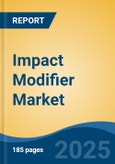Speak directly to the analyst to clarify any post sales queries you may have.
10% Free customizationThis report comes with 10% free customization, enabling you to add data that meets your specific business needs.
Key Market Drivers
Growing Demand of Impact Modifier in Automotive Industry
The automotive industry's push toward lightweight vehicle designs to improve fuel efficiency and reduce emissions is a major factor driving demand for impact modifiers. With global sales of light commercial vehicles projected to reach 29.53 million units by 2025 - and the U.S. alone expected to contribute around 14.09 million units - the use of plastics in vehicle manufacturing is increasing. However, to meet performance requirements, these plastics must withstand high impact, stress, and varying environmental conditions. Impact modifiers improve the toughness of these lightweight materials, enhancing their resilience against cracking or mechanical failure. This makes them particularly valuable in producing automotive components that need to endure daily wear, temperature fluctuations, and collision impacts, all while helping manufacturers meet regulatory and sustainability targets.Key Market Challenges
Volatility in Prices of Raw Materials
A significant challenge for the global impact modifier market is the high volatility in raw material prices. These fluctuations, driven by factors such as geopolitical instability, supply-demand imbalances, and economic shifts, complicate production cost forecasting for manufacturers. Many raw materials used in impact modifier production are derived from petroleum-based inputs, making the market highly sensitive to changes in oil prices. Sharp cost increases can squeeze profit margins, especially when manufacturers are unable to pass higher input costs to end users. While some companies pursue fixed-price agreements with suppliers to mitigate uncertainty, this approach is limited when raw material prices trend upward. This ongoing cost unpredictability makes long-term planning difficult and affects the competitiveness of smaller firms.Key Market Trends
Shift Towards Sustainable and Eco-Friendly Modifiers
The impact modifier market is increasingly shaped by the global shift toward sustainability and environmental responsibility. Manufacturers are prioritizing the development of bio-based and low-toxicity modifiers to align with regulatory pressures and rising consumer expectations for eco-friendly materials. This transition supports global efforts to reduce carbon footprints and dependency on petroleum-based inputs. Industries such as construction, automotive, and packaging are integrating sustainable practices throughout their supply chains, thereby accelerating the demand for green alternatives in plastic formulation. As environmental standards tighten worldwide, the move toward sustainable impact modifiers is expected to become a core component of long-term industry growth and innovation.Key Market Players
- Addivant USA Holdings Corp.
- Akdeniz Kimya Sanayi Ve Ticaret A.S.
- Arkema SA
- Clariant AG
- The Dow Chemical Company
- Evonik Industries AG
- Kaneka Americas Holding Inc.
- Mitsubishi Chemical Corporation
- Plastics Color Corporation
- Shandong Ruifeng Chemical Co. Ltd
Report Scope:
In this report, the Global Impact Modifier Market has been segmented into the following categories, in addition to the industry trends which have also been detailed below:Impact Modifier Market, By Type:
- ABS
- CPE
- MBS
- Acrylic
- EPDM
- Others
Impact Modifier Market, By Host Polymer:
- PVC
- PMMA
- Polyolefin
- Polyester
- Polyamide
- Others
Impact Modifier Market, By End User:
- Construction
- Packaging
- Automotive
- Consumer Goods
- Others
Impact Modifier Market, By Region:
- North America
- United States
- Canada
- Mexico
- Europe
- France
- United Kingdom
- Italy
- Germany
- Spain
- Asia Pacific
- China
- India
- Japan
- Australia
- South Korea
- South America
- Brazil
- Argentina
- Colombia
- Middle East & Africa
- South Africa
- Saudi Arabia
- UAE
Competitive Landscape
Company Profiles: Detailed analysis of the major companies present in the Global Impact Modifier Market.Available Customizations:
With the given market data, the publisher offers customizations according to a company's specific needs. The following customization options are available for the report.Company Information
- Detailed analysis and profiling of additional market players (up to five).
This product will be delivered within 1-3 business days.
Table of Contents
Companies Mentioned
- Addivant USA Holdings Corp.
- Akdeniz Kimya Sanayi Ve Ticaret A.S.
- Arkema SA
- Clariant AG
- The Dow Chemical Company
- Evonik Industries AG
- Kaneka Americas Holding Inc.
- Mitsubishi Chemical Corporation
- Plastics Color Corporation
- Shandong Ruifeng Chemical Co. Ltd
Table Information
| Report Attribute | Details |
|---|---|
| No. of Pages | 185 |
| Published | June 2025 |
| Forecast Period | 2024 - 2030 |
| Estimated Market Value ( USD | $ 4.26 Billion |
| Forecasted Market Value ( USD | $ 5.34 Billion |
| Compound Annual Growth Rate | 4.0% |
| Regions Covered | Global |
| No. of Companies Mentioned | 10 |









